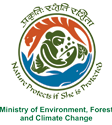


Friday, Tuesday, March 21, 2023
Union Minister for Environment, Forest and Climate Change, Shri Bhupender Yadav today released 14 guidelines to address Human-Wildlife Conflict (HWC), which aim to facilitate a common understanding among key stakeholders, on what constitutes effective and efficient mitigation of HWC in India. The guidelines are advisory in nature, and will facilitate in further development of site-specific HWC mitigation measures. These guidelines are developed under the Indo-German cooperation project on HWC Mitigation, which is being implemented by Ministry of Environment, Forest and Climate Change (MoEFCC) together with Deutsche Gesellschaft fur Internationale Zusannenarbeit (GIZ) GmbH and state forest departments of Karnataka, Uttarakhand and West Bengal.
The training aimed at facilitating technical competencies of the RRT personnel for field testing of selected processes from the Standard Operating Procedure (SOP) on Human-Leopard Conflict Mitigation. 40 participants from five wildlife squads (RRTs) and four Rangers of Gorumara Wildlife and Jalpaiguri Territorial divisions participated in this training.
10 species-specific guidelines-
4 guidelines on cross-cutting issues-
The development and intended implementation of these guidelines is driven by a harmonious-coexistence approach to ensure that both humans and wild animals are protected from the negative impacts of HWC. These guidelines are strongly driven by field experiences, and take into consideration the existing guidelines and advisories issued by various agencies and state forest departments, as well as their good practices, and build on them.
The guidelines provide a framework to take a holistic approach, viz., not only addressing the emergency situations arising due to immediate HWC situations but also addressing the drivers and pressures that lead to HWC, guidance on establishing and managing prevention methods, and reducing the impact of conflict both on humans and wild animals.
The preparation of the guidelines followed a participatory, inclusive, and integrated approach involving key relevant stakeholders and sectors including agriculture, veterinary, disaster management, district administration, rural development and Panchayati Raj Institutions, NGOs, and media. A total of 105 events- workshops, regional and national consultations, meetings, and field missions were organized, under the Indo-German Project on HWC Mitigation, during August 2018 to February 2022, with more than 1600 participants. An intensive and systematic process of pilot testing of the guidelines was facilitated for the states to test and report on the feasibility and acceptability of their recommendations expressed in the draft guidelines.
This set of guidelines is not a static document; rather, it is a living document, where feedback from field practitioners and other wildlife experts is planned to be analysed to assess the specific elements and sections that need to undergo changes. A review of these guidelines is planned to take place every five years from 2023 onwards.
***
